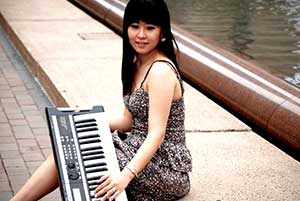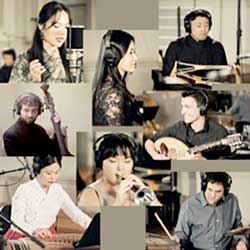
Join in on Zoom for a conversation with pianist and composer Mina Cho as she opens a jazz dialogue between Asia Minor and East Asia and to view a documentary about the Project’s new album Greeting the Moon on Thursday, May 6, at 6:30 p.m.
Cho is a 2020 Somerville Arts Council Somerville Artist of the Month and contemporary music director at Somerville Community Baptist Church, where her husband serves as pastor. Cho is also a friend to the Somerville Museum, musically supporting its projects.
The Somerville Museum is pleased to present a documentary about Cho’s GREEKOREA project, part of which was filmed at the museum, and a conversation with this wonderful artist.
During a year with little actual travel connecting Boston, Athens and Seoul, the Korean-born pianist and composer Mina Cho has fostered a linear yet expansive musical itinerary of her own.
GREEKOREA, a series of compositions exploring artistic and cultural similarities between the divergent musical styles of East Asia and Asia Minor, bridges Greek and Korean musical traditions largely through the jazz and gospel idioms that first prompted Cho’s move to the United States more than a decade ago.
 Originally planned as a live performance for May 2020, GREEKOREA’s cancellation amid the COVID-19 pandemic spawned virtual recording sessions. Recorded in pandemic conditions in three different countries, with numerous rehearsals and overdubs, the album stands as a testament to the power of organic musical relationships nurtured over many years of collaboration.
Originally planned as a live performance for May 2020, GREEKOREA’s cancellation amid the COVID-19 pandemic spawned virtual recording sessions. Recorded in pandemic conditions in three different countries, with numerous rehearsals and overdubs, the album stands as a testament to the power of organic musical relationships nurtured over many years of collaboration.
Having studied piano since age 5, Cho had often dipped into gospel-style improvisations as a respite from the rigors of the classical repertory. Later, as a freshman theology student at Seoul’s Yonsei University, she encountered a gospel chorus singing a setting of Psalm 23 in chapel that compelled her to return to music.
After graduating with a degree in theology in 2005, and inspired by the emotional directness she found in Korea’s active gospel and fledgling jazz scene, Cho then applied to Boston’s Berklee College of Music. Once in Boston, her musical imagination was further ignited by rhythms from Africa and Latin America, with pianist-composers Fred Hersch and Ben Schwendener serving as role models in personalizing diverse musical inspirations within an intimate compositional voice.
Only after Cho had expanded her interest into other musical cultures – most notably Mediterranean influences, with nearly 10 years of collaboration with Cyprus-born percussionist George Lernis and similarly fruitful exchange with the Epirus-born laouto player Vasilis Kostas – did she pay similar attention to her own musical traditions. Beginning with the gayageum, a traditional Korean zither, and later turning to percussion, Cho’s musical studies have encompassed a broad array of Korean idioms.
Each track of GREEKOREA finds common ground between east and west, old and new. Dalmaji (Night of the Full Moon) drapes the pentatonic melody greeting the first full moon of Korea’s Lunar New Year in lush jazz-gospel harmonies. In Mandarin, My Love, a traditional Greek song finds new life in Korean translation following extended instrumental improvisations. Milyang Arirang, a veritable Korean anthem, unfolds within a juxtaposition of jagged Korean and Mediterranean rhythms.
“Culturally, the two countries have much in common,” Cho says. “Greece was under the Ottoman Empire for centuries, and Korea was occupied by Japan from 1910 to 1945. They both had a similar relationship with the west.”
And all three cultures, she adds, find similar refuge in music. “In America, people talk about the ‘blues.’ In Korean music, you have han. The Greeks have rebetiko, which some people actually call ‘the Greek blues.’ But the Korean concept of han isn’t simply about describing these painful struggles but also overcoming them. I think that’s what makes it unique. It’s about transitioning from darkness to something positive.”
Preview videos:
Dalmaji (Night of the Full Moon): https://youtu.be/0lkSocIr3qY
Korean drum prelude to Dalmaji: https://youtu.be/PtbfmjekmhQ
Percussion commentary (George Lernis and Insoo Kim): https://youtu.be/izErUkT7OC8
MUSICIANS (The Gugak Jazz Society):
Mina Cho – piano (USA)
Insoo Kim – Korean percussion (janggu, kkwaenggwari, jing, sori-buk) (Korea)
DoYeon Kim – Korean zither (gayageum) (USA)
Nayeon Lee – Korean wind instruments (piri, saengwhang, taepyungso) (Korea)
Narae Lee – vocals in the style of Pansori (Korea)
George Lernis – drums, Middle Eastern percussion (darbuka, bendir, riq) (USA)
Vasilis Kostas – Greek lute (laouto) (USA/Greece)
Max Ridley – bass
Mina Cho website: http://www.minachojazz.com
International Gugak Jazz Institute: https://www.IGJI.org















Reader Comments